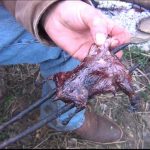Raising Ducks: How to Get Started Easily
Ducks are Easier to Manage
Ducks don’t need to be confined to the extent of their chicken cousins. In fact, you generally don’t need a lot of fencing to keep them from running off. They are also easier to corral, lead and move around, and they tend to be more cooperative. They also don’t scatter to the four winds of the earth like chickens. However, ducks fly, but this problem can easily be solved by cutting their main feathers a couple of times a year to keep them grounded.
Ducks are Good Eaters
Ducks love lots of insects that chickens tend to avoid, and these include destructive grubs, snails and other creepy-crawlers. They are also far less destructive to gardens and avoid many fruits and vegetables that chickens damage. Ducks are also known to go after mosquito larvae and parasites that commonly impact livestock. All in all, ducks are kinder, gentler and require less feed than chickens as well, especially if they have some land and water where they can forage.
Ducks are Resilient
Ducks are considered to be more “hearty” than chickens. They are less susceptible to catching diseases or getting sick. They require a lot loss care and maintenance generally fend for themselves. However, ducks do have problems with their legs and feet, and care needs to be taken when handling them. Carry a duck as you would a cat other small animal in order to protect this sensitive and fragile area of their body.
Ducks Don’t Need a Pond
Contrary to popular belief, ducks do not need a pond or lake in order to be happy. They do love water, but maintaining an artificial pond can become a time-consuming hassle as they will degrade water quality with their droppings and cleaning routines. The best way to keep ducks hydrated and entertained is by using a small wading or child pool that’s deep enough for them to waddle in and dunk their heads and necks.
Ducks are messy, and tend to splash water everywhere. This can lead to a muddy, gunky mess if you keep their housing area near to where they bathe and play. Their droppings also tend to be a little more pungent and gooey than chickens as well. However, they are also very nutrient-rich and provide an excellent source of fertilizer, especially if they are free to roam around the property.
Shelter
Ducks need a warm, cozy and safe place to nest and call home. However, you don’t need to construct elaborate hen-houses like you would with chickens. You do need to construct a perimeter fence to keep predators at bay, because ducks are an ideal meal for opportunistic coyotes and dogs. However, getting a good guard dog is a great way to provide 24 hour protection as well.
Ducks also like routines, so establish a feeding and maintenance schedule early-on. Their breeding preferences also differ from chickens, and the general consensus is that a 3:1 ratio of females to males is ideal to promote optional health and minimal stress.
Duck eggs and meat are also important commodities, and their nutritional value as well as taste is quite delicious. Feathers can be used for a variety of practical purposes, and can be gathered as they are shed. Finally, ducks tend to be more sociable and less aggressive, and their presence on farms and in back yards can also provide a nice, cute and enjoyable diversion to life on the homestead.
Learn more about ducks and how you can combine them with chickens or use them exclusively. They may turn out to be a practical and viable alternative that can produce benefits for years to come.
More Articles From This SIte
Pages:
- 1
- 2
















